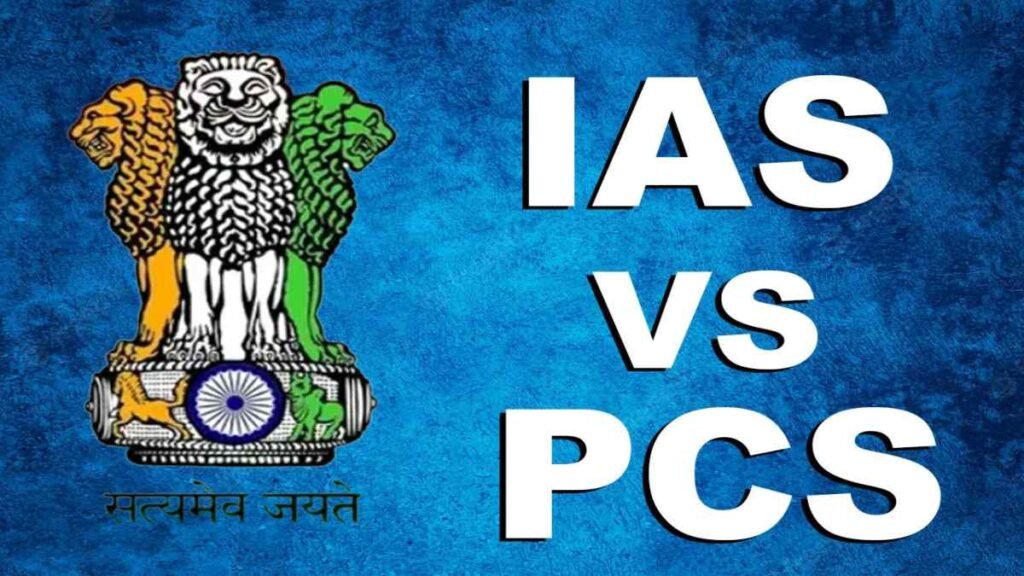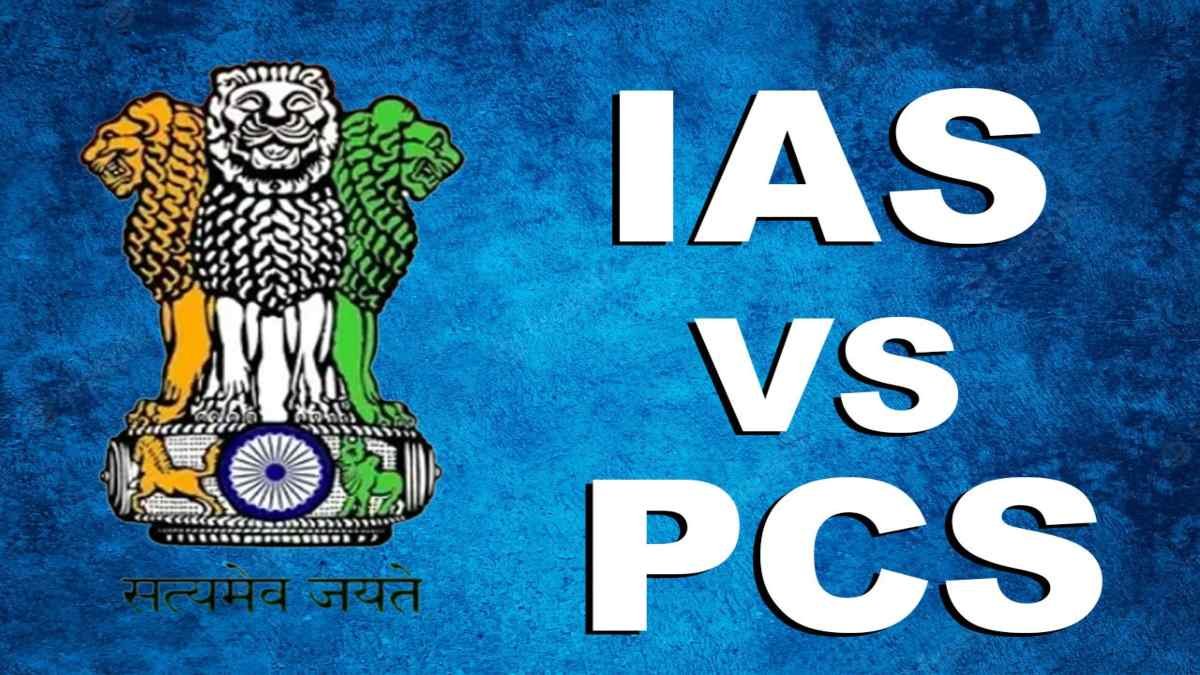
Introduction
Difference between IAS and PCS Officers, In India the government’s administration is an essential part of keeping order and law and also ensuring the development as well as managing the resources. The administration’s foundation is comprised of civil servants who are responsible for the implementation of policies at various levels. The most renowned positions are that of IAS (Indian Administrative Service) and PCS (Provincial Civil Service) officers. Although both are highly-regarded posts, there are significant differences in their duties in selection and selection processes and career advancement and authority levels. We’ll explore these differences to discover the methods by which IAS and PCS officers participate with governance in various ways.
Difference between IAS and PCS Officers, Selection Process
1. Selection Process
IAS: The Indian Administrative Service is one of the All-India Services, and candidates are chosen through the demanding UPSC (Union Public Service Commission) Civil Services Examination. This test involves a three-stage process that comprises the preliminaries Exam as well as the main Exam and an Interview (Personality Test). Candidates who pass each step with the best scores are qualified to apply for IAS as well as other options such as IPS as well as IFS.
PCS Provincial Civil Service officers are selected from States Public Service Commission’s (such as UPPSC, MPPSC, etc.). Every state offers its own examination to recruit PCS officers. The format is generally similar to UPSC but it could vary from state to state usually consisting of an initial test and a final exam and an interview round. PCS selection is administered by states, unlike IAS, which can be a federal examination.
2. Roles and Responsibilities
IAS officers IAS officers carry a range of duties and play an important role in the execution of the central policies. They work at both the federal and state levels, taking on the duties as District Collectors (DCC) and Sub-Divisional Magistrates (SDM) and several other secretarial positions. They are responsible for the formulation of policies, as well as the implementation and management of administrative processes within different departments, ranging from financial planning to urban planning, and much more.
PCS officer PCS officers work at the state level, carrying out administrative duties similar to IAS however within their own states. They are in charge of implementing state-wide laws and policies, and also the collection of revenue and public welfare programs. Certain roles, such as Tehsildar Development Officer as well as Deputy Collector are normally performed with PCS officers.
3. Authority and Powers
IAS officers IAS officers enjoy greater authority due to their ability to work in a variety of states, and also be appointed to posts inside the national government. They are accountable to several ministries and departments, and also assist in forming policies at a national level. Due to their flexibility and the broad range of their responsibilities IAS officers are generally thought to be more powerful and influential than PCS officers.
PCS officer PCS officer are being employed at the highest levels of administrative authority in an individual state. They are not typically transferred out of their state. While they are within their areas of authority, they are working within the guidelines and policies established by the state government. PCS officers are crucial in implementing state-wide plans however; they do not have the same authority over national affairs like IAS officers.
4. Career Growth and Promotion
IAS officials: IAS officers are often elevated faster and are promoted to higher positions, including the secretary of Government of India or Chief Secretary of States. IAS officers are also qualified to be central deputies. That means they are able to work on behalf of central agencies, the public sector firms as well as international organizations like the UN. Their professional development and exposure are higher, which could lead them to positions of power.
PCS officer PCS officers are valuable but generally, they are not as advanced in their careers. They typically aren’t in a position to attain the top executive positions. They may be elevated to positions like the Divisional Director or Additional District Magistrate but they’re typically restricted to administrative positions at the state level. Contrary the IAS official, PCS employees typically aren’t offered the possibility of central deputation, which limits their advancement to jobs at the state level.
5. Salary and Perks
IAS officers IAS officers are paid competitively in accordance with the 7th Pay Commission, with numerous benefits, like accommodations in government buildings, official vehicles, security for their vehicles medical benefits, as well as other allowances. Due to their position, IAS officers’ packages contain allowances, and are generally larger than PCS officers.
PCS officer PCS officers’ salaries are determined by the 7th Pay Commission, although generally speaking, they are paid less than IAS officers’. PCS officers also enjoy benefits like transportation, housing and health insurance. However, their benefits differ from state to state and can be less than what IAS officers enjoy due to their position in the hierarchy of administrative officers.
6. Transfers and Job Security
IAS officers IAS officers can be transferred between states or ministries, which results in various career paths however, it is not without the need for frequent shifts. But their security IAS officers are extremely high. IAS officer’s security is secure, due to appointments made by President of India and the protection afforded by Constitutional laws.
PCS officers PCS officers generally have less chances of transfer because they are portion of the State. However, they could be assigned to different departments or states within their respective state. Like IAS officers PCS employees have the benefit of security of job, but PCS officers are selected by governors from their respective states. Furthermore, states may have a different policies regarding transfer.
FAQs on IAS and PCS Officers
Q1. What happens if a PCS officer is made an IAS officer? Yes, PCS officers can be elevated to IAS within a period of time in accordance with their performance and vacant positions within the IAS. IAS cadre. They also have to go through an official selection process prior to when they can be admitted to IAS.
Q2. What is the minimum education required to become an IAS (or PCS) officer?
The minimum requirement for being eligible to be eligible for IAS and PCS must be an undergraduate level degree at an institution that is accredited.
Q3. Which is the more difficult test, UPSC or State PSC?
UPSC examinations are generally considered as more challenging due to its wide range, competitive nature and the national selection. But, State PSC examinations may be less competitive; however they still pose a challenge.
Q4. Do IAS and PCS officers receive the same instructions?
IAS officers are educated in the Lal Bahadur Shastri National Academy of Administration (LBSNAA) in Mussoorie and PCS officers are trained at the state-level academy. IAS instruction is much more thorough. IAS training is far more extensive and covers the broadest range of topics and government-related issues.
Q5. Is it true IAS officers are more effective than PCS staff?
IAS officers typically are more powerful as they are an integral part in the government centrally. They are able to influence policy both at both state and national levels. PCS officers are a part of the state’s administration and are confined to their states so they are unable to influence the national policy.
Conclusion
IAS and PCS officers are vital components of the Indian administrative structure. There are IAS officers operating at a national level and PCS officers who assist in the state-wide management. Although they work in the same fields the scope, authority and professional path of IAS officers differ in comparison to PCS officers. Knowing the differences will assist candidates in making an informed decision about their future career plans and the contribution they’d like to contribute to the country.
